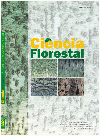
|
Ciência Florestal
Centro de Pesquisas Florestais - CEPEF, Departamento de Ciências Florestais - DCFL, Programa de Pós Graduação em Engenharia Florestal - PPGEF
ISSN: 0103-9954
EISSN: 0103-9954
Vol. 28, No. 3, 2018, pp. 1293-1302
|
 Bioline Code: cf18116
Bioline Code: cf18116
Full paper language: Portuguese
Document type: Note
Document available free of charge
|
|
|
Ciência Florestal, Vol. 28, No. 3, 2018, pp. 1293-1302
| pt |
IMPORTÂNCIA DO MANEJO DE FLORESTAS NATIVAS PARA A RENDA DA PROPRIEDADE E ABASTECIMENTO DO MERCADO MADEIREIRO
Andrae, Franz Heinrich; Schneider, Paulo Renato & Durlo, Miguel Antão
Resumo
A produção brasileira de madeira industrial baseia-se essencialmente nas plantações florestais, porém,
somente no setor de serraria existe ainda uma parcela apreciável de toras de origem de florestas nativas,
desconsiderando o uso da madeira para fins energéticos. Com a criação de concessões florestais deu-se
um passo importante rumo ao manejo das florestas nativas do norte do país. Já no extremo sul existem
florestas nativas somente em estágios de recuperação, em propriedades familiares e cujo manejo é muito
restrito. No presente artigo argumenta-se sobre a importância de manejar as florestas nativas, mesmo em
pequenas propriedades. Para isto, toma-se como exemplo o caso da Áustria, cujo território é dominado por
florestas nativas em pequenas propriedades. A tradição deste uso é baseada em uma legislação adequada,
no trabalho do serviço de extensão e de pesquisa que geram um ambiente no qual os benefícios materiais e
imateriais da floresta se aliam aos interesses da sociedade e aos econômicos dos proprietários. O manejo das
pequenas unidades florestais permite alcançar um regime de sustentabilidade periódico, cujas intervenções
silviculturais partem das condições locais, sendo o objetivo central a árvore e não o povoamento. Este
procedimento de manejo, atualmente recomendado para a produção de madeira de elevado valor econômico,
é descrito de maneira resumida.
Palavras-chave
floresta colonial; floresta mista; latifoliadas
|
| |
| en |
IMPORTANCE OF NATIVE FOREST MANAGEMENT FOR INCOME OF FARMS AND THE SUPPLY OF TIMBER MARKETS
Andrae, Franz Heinrich; Schneider, Paulo Renato & Durlo, Miguel Antão
Abstract
The Brazilian production of industrial timber depends mainly on forest plantations; only in the sawmill
sector, there is still the use of a considerable amount of logs originating from natural forests. Recently
forest concessions were created; this was an important step toward the management of native forests in
the North. In the very South of Brazil, native forests exist mainly in stages of regeneration, belonging to
small-scale farmers with restricted opportunities for management. The present article argues the importance
of native forest management even when they belong to small landowners. An example from Austria is
given where small ownership is dominating native forests. There is a framework of traditional use, an
adequate legislation and the effort of extension service, able to ally immaterial social benefits and economic
interest of forest owners. The management of generally small forest units is aiming a so-called periodic
sustainability; decisions of silvicultural treatments are based on local conditions, where to an individual
tree is given more attention than to the stand; the objective of management is mainly timber of high value;
a summarized description of practical procedure is given.
Keywords
family forestry; mixed forests; broadleaved species
|
| |
© Copyright 2018 - Ciência Florestal
Alternative site location: http://cascavel.ufsm.br/revistas/ojs-2.2.2/index.php/cienciaflorestal/index
|
|
